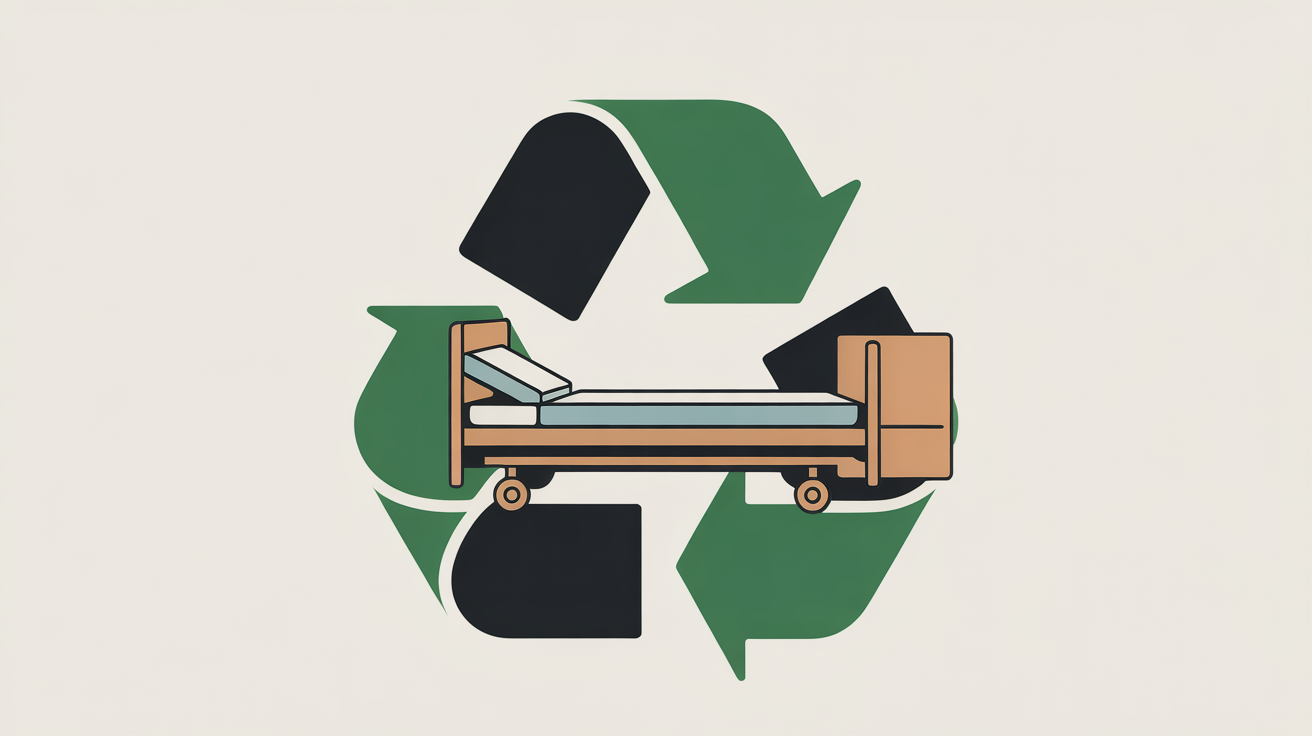When Kaiser Permanente needed to clear out 125 hospital beds fast, they faced a problem familiar to many healthcare facilities. New equipment was arriving soon. Storage space was already tight. And traditional disposal would cost thousands.
Instead of weeks of coordination and hefty disposal fees, they got something better: complete removal in three days, plus a check for the recycled materials.
The Real Challenge Wasn't Just the Beds
Picture this: You're a facilities manager at a major hospital. You've got 125 full-size hospital beds taking up valuable space. Each bed weighs several hundred pounds. They contain motors, electronics, and various metals. State and federal regulations dictate how you can dispose of them.
Now add a deadline. New beds arrive next week.
This was Kaiser Permanente's situation. They couldn't just call any hauling company. Medical equipment requires special handling. The beds contained:
Heavy steel frames
Aluminum side rails
Electronic control systems
Specialized motors
Medical-grade plastics
Traditional disposal meant coordinating multiple vendors, securing temporary storage, and managing a paper trail of compliance documents. The timeline? Usually two to three weeks minimum.
Enter Willis Recycling's Mobile Fleet
Willis Recycling, a three-generation Sacramento family business, took a different approach. Within 24 hours of Kaiser's call, their trucks were on site.
Here's what actually happened over those three days:
Monday morning: The Willis team arrived to assess the situation. They counted beds, checked access routes, and coordinated with hospital staff to avoid disrupting patient care. By afternoon, they'd already started organizing the beds by material type.
Tuesday: Multiple trucks worked simultaneously. Some beds needed partial disassembly to fit through doorways. Others rolled straight onto flatbeds. The team maintained clear pathways for hospital operations throughout.
Wednesday afternoon: The last bed left the building. Willis provided complete documentation for Kaiser's compliance records. The storage area was clear and ready for the new equipment.
The Financial Flip
Here's where it gets interesting. Kaiser expected to pay thousands in disposal fees. Instead, they received money back.
Those 125 beds contained significant amounts of recyclable steel and aluminum. Electronics went to certified e-waste recyclers. Even some plastic components found new life. Willis Recycling processed everything through their established network, turning potential waste into valuable commodities.
The immediate benefits were clear:
No disposal fees
Recycling rebates for metal content
Zero storage rental costs
Staff stayed focused on patient care, not logistics
But the real value went deeper. Kaiser avoided the hidden costs that kill hospital budgets: delayed equipment installations, compliance violations, and the endless hours of coordinating multiple vendors.
Why Speed Matters in Healthcare
Hospitals operate differently than other businesses. When a patient room sits empty because old equipment blocks new installations, that's lost revenue. When staff navigate around stored beds in hallways, that's a safety risk.
The 72-hour turnaround meant Kaiser could stick to their upgrade schedule. New beds arrived on time. Patient care continued uninterrupted. No temporary storage. No safety hazards. No compliance headaches.
This efficiency matters more than most people realize. Healthcare facilities constantly cycle through equipment. Beds, gurneys, IV stands, imaging equipment housings – they all eventually need replacement. Each upgrade project presents the same challenge: How do you clear the old to make room for the new without disrupting operations?
The Recycling Advantage
Willis Recycling brings something unique to these projects. Their fleet includes everything from pickup trucks to semis. They serve all of California. Most importantly, they understand healthcare's specific needs.
Mobile recycling means the recycler comes to you. No loading equipment onto your trucks. No transporting materials to distant facilities. No wondering if you're meeting regulatory requirements.
For Kaiser, this meant:
Single point of contact for the entire project
One company handling all materials
Complete documentation trail
Guaranteed regulatory compliance
Making It Work for Your Facility
Every hospital faces equipment turnover. The question isn't if you'll need large-scale disposal – it's when.
Consider your last equipment upgrade. How long did disposal take? What did it cost? How many vendors did you coordinate?
Now imagine handling it in three days or less. With one phone call. And getting paid instead of paying.
Whether you're replacing ten beds or two hundred, the process stays the same. Assessment, coordination, execution. The right equipment and experience make the difference between a multi-week headache and a three-day success story.
Your Next Equipment Upgrade
Willis Recycling handles more than just beds. HVAC units, medical carts, outdated imaging equipment housings – if it contains metal, they can recycle it. Their mobile service covers facilities throughout California.
The Kaiser Permanente project proves something important: Hospital recycling doesn't have to be complicated. With the right partner, you can transform disposal costs into revenue while maintaining full compliance.
Ready to flip your next equipment disposal from expense to income? Contact Willis Recycling at (916) 271-2691. They'll assess your needs, provide a timeline, and show you how hospital recycling really works.
About Willis Recycling: A family-owned Sacramento business serving California's recycling needs for three generations. Specializing in mobile commercial and medical facility recycling with a fleet ranging from pickups to semi trucks.



